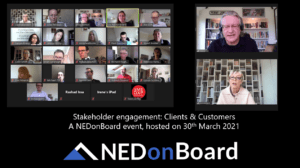The ESG agenda should now be firmly on the board agenda. If it is not, it could be leaving the business open to high impact risks, missed opportunities and reputational damage. Multiple stakeholders are increasingly making investment decisions based on how a business addresses the environmental and social impacts it is creating. Furthermore, ESG rating agencies drive indexation decisions for equity and debt providers, and as a result, regulators consider the company publications that drive those ratings.
Non-executives, boards and senior management have the opportunity to improve their current operating model.
In late 2022, Grant Thornton partnered with NEDonBoard to survey board members on their role in driving their firm’s ESG agenda. The key themes which emerged were:
- Engagement: Half of respondents feel consulted with and listened to
- Competencies: Half of respondents have a good understanding of how ESG policies should be embedded in their business
- Skills: Half have confidence that their Executive Team could build and deliver an ESG strategy
- ESG data: 10% think their organisation has well-developed systems and processes for ESG data collection
The survey highlights that non-executive engagement on the ESG agenda has room for improvement, particularly given the confidence levels around the skills and competencies of the executives and their teams to integrate an effective and robust ESG strategy that underpins the overall business.
The use of ESG reporting and KPIs, processes and controls, and systems and data will help improve performance. Ensuring there is clarity on who does what and being sure colleagues understand the ‘why’ and the ‘how’ behind the strategic priorities will drive the business agenda forward.
The effective non-executive should also be asking themselves and the board – ‘what else can be done to improve the businesses approach to ESG?’.
We consider the following five areas are where insight and challenge can be valuable:
- Understanding your industry through an ESG lens
It is important to start with a comprehensive understanding of the environmental, social and governance issues that are material to your industry by analysing peers, standards, frameworks, and industry trends
- Identifying your ESG material issues
Understand how material issues across the industry impact your own business model by ensuring that you listen to your key stakeholder views (both internal and external). Although this may require resource, a formal ‘Materiality Assessment’ is considered best practice to ensure there is a focus on strategic priorities most relevant to your business
Related post: Environmental, social and governance (ESG): four key questions for NEDs
- Developing your ESG strategy
Work with your executive teams to agree longer term commitments across your ESG strategic priorities and ensure department heads are collaborating and incorporating these priorities into their short-, medium- and longer-term strategy plans.
Related post: Embedding ESG into strategy
- Data
ESG data is known to be challenging across industries regardless of the size of the organisation. Once you have agreed KPI’s to measure performance, identify what data is already available within your current systems and explore with your data teams the best way to close data gaps required.
- Being transparent and accountable
Investors, asset managers and rating agencies continue to prioritise ESG performance across their decision-making to minimise risk. Key focuses include: climate change, biodiversity, ESG executive remuneration/incentives, DE&I and supply chain transparency. Effective communication of your ESG performance, reflected through ESG regulatory requirements, voluntary disclosures and KPIs across your reporting suite will help ensure the rating agencies ratings accurately represent your performance.
This informed approach will support the non-executive in asking the right questions and ensuring effective ESG strategies are put in place to drive sustainable, long-term value creation and minimise risk.
Written by Scott Wilson, Head of ESG at Grant Thornton UK; Casper Kaars Sijpesteijn, Consulting Associate Director at Grant Thornton UK and Deap Khambay, ESG Strategic Solutions Associate Director at Grant Thornton UK.
For further information, please contact Scott Wilson at [email protected].
Want to know more?
Upskill today and fill any knowledge gap you may have to secure your next NED appointment: sign-up to one of our training courses and qualify as a professional NED.
Join a professional body and institute, solely dedicated to non-executive directors and board members. Network with peers and invest in your ongoing professional development: join NEDonBoard, the Institute of Board Members




